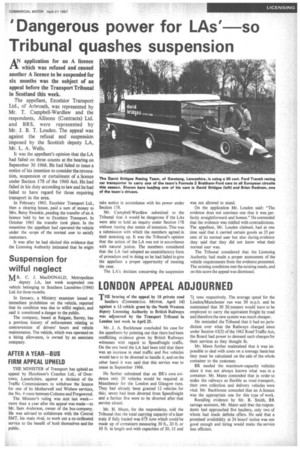LONDON APPEAL ADJOURNED
Page 39

If you've noticed an error in this article please click here to report it so we can fix it.
THE hearing of the appeal by 18 private road
hauliers (COMMERCIAL MOTOR, April 14) against a 12 1.ehiele grant by the North Western deputy Licensing Authority to British Railways was adjourned by the Transport Tribunal in London last week to April 25.
Mr. J. A. Backhouse concluded his case for the appellants by pointing out that there had been conflicting evidence given by British Railways witnesses with regard to Speedfreight traffic. On the one hand the LA had been told that there was an increase in steel traffic and five vehicles would have to be diverted to handle it, and on the other hand it was said that this service was to cease in September 1966.
He further submitted that on BR's own evidence only 20 vehicles would be required at Manchester for the London and Glasgow runs. They had already been granted 12 vehicles for this; seven had been diverted from Speedfreight and a further five were to be diverted after that service closed.
• Mr. H. Mann, for the respondents, told the Tribunal that the total carrying capacity of a liner train if fully loaded was 675 tons which could be made up of containers measuring 30 ft., 20 ft. or 10 ft. in length and with capacities of 20, 15 and
71 tons respectively. The average speed for the London/Manchester run was 50 m.p.h. and he maintained that 30 20Jonners would have to be employed to carry the equivalent freight by road and therefore the new system was much cheaper.
He reminded the Tribunal that it had no jurisdiction over what the Railways charged since under Section 43(3) of the 1962 Road Traffic Act, the Board had power to demand such charges for their services as they thought fit.
Mr. Mann further maintained that it was impossible to deal with costs on a tonnage basis but they must be calculated on the sale of the whole container to the customer.
BR needed the maximum-capacity vehicles since it was not always known what was in a container. Mr. Mann contended that in order to make the railways as flexible as road transport, their own collection and delivery vehicles were vital. Mr. Backhouse conceded that an A licence was the appropriate one for this type of work.
Recalling evidence by Mr. R. Smith, BR cartage assistant, Mr. Mann said that the respondents had approached live hauliers, only two of whom had made definite offers. He said that a promised availability at 24 hours' notice was not good enough and hiring would make the service less efficient.




































































































































